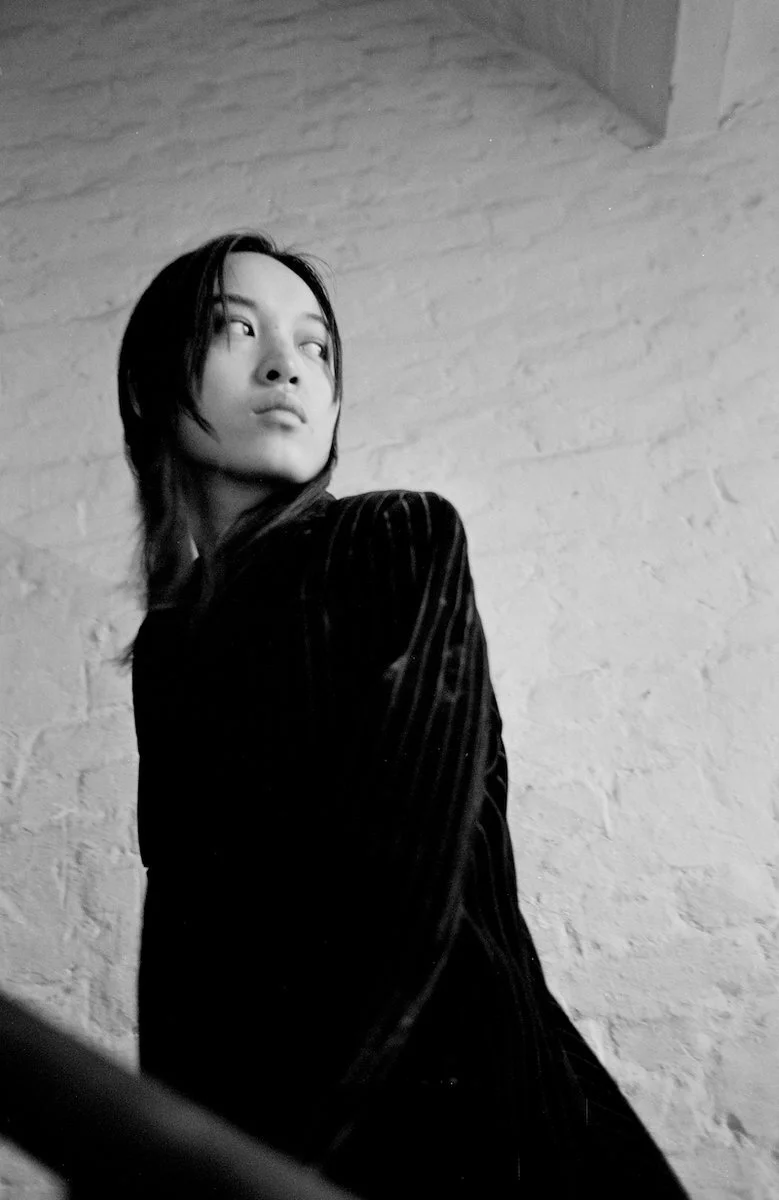Forever Fluid: Music from 10 Queer Asian Artists You Should Know About
Artwork: Laurent Yee
Pride month is a celebration, albeit a bittersweet one that comes at a cost. Large corporations pinkwash, signalling that they respect queer people while hypocritically invalidating queer rights. Pride month ends, and the rainbow profile pictures go down, but living as a queer individual is forever – just like every other day in the year, we cannot celebrate pride in an unbridled way. In this landscape, we find deep solace in knowing that our community is going through the same thing in solidarity.
Last year, we launched our site with a Posipride playlist of queer musicians. This year, we are sharing 10 phenomenal tracks from queer Asian artists we love, from Southeast Asia, East Asia and diasporas beyond that you should take a listen to.
Of course, there are an endless list of artists flying the pride flag high, representing their identities on their own terms. With how impossibly large the Asian continent is, we can’t possibly list all of these artists. For this list, we looked to have some range across the Asian continent, while also limiting it to our top 10 finds.
As one of the artists we included on this list, Pan Daijing, says: “Why not just pick some people that make good music – whatever their gender is.” We’ve adopted that same spirit here, curating music we genuinely love, in addition to including as much sonic diversity for our picks as we can, ranging from indie folk and hardcore punk, to chiptune and full-on ambient soundscapes.
Pride is forever, baby.
Credit: NET GALA Official SoundCloud
NET GALA – Dodomzit (A Radical, Cynical Tool)
Korea
NET GALA finds living as a queer, non-binary individual antithetical to being Korean. Their music is a documentation of this tension, situating themselves within Korean culture at large while being unabashedly freewheeling – in their DJ sets NET GALA frequently samples K-pop, and their upcoming EP, Shinpa, is inspired by traditional Shinpageuk (신파극) theatre. All of it exists in a genre of their own right, which NET GALA calls Obnoxious Electronic Music (OEM).
In that sense, NET GALA’s music is an act of self-love, which they hint at when describing their Boiler Room DJ set: “imagining a “perfect cyber-dystopia-queer-rave”, “with full self love energy and multiple emotional breakdowns.” The use of the word “dystopia” here suggests that utopia – clean, pure, whitewashed – is ironically uncomfortable for queer people, and the feeling of discomfort is a familiar shoulder to lean on.
This is emblematic in his music, where discomfort becomes poetic. His latest single, Dodomzit (A Radical, Cynical Tool) begins with relentless beats, overlaid with a myriad of introspective, melody-less sounds bearing no resemblance to traditional instruments, which create immersive soundscapes that render his beats as assault. As he slowly introduces more layers of percussion, its preceding sounds take their time to shine in different permutations, before swelling into a climax punctuated by a sample of a lesbian Korean protestor. NET GALA’s sample originates from her fight for existence in a presidential rally in 2017, and here, his percussion layers escalate into a cacophony that mirrors her rage in solidarity.
Eventually, it devolves into a direct, techno-like drone, before ending suddenly with a squelchy snare. The abrupt closure of the track evokes its absurd title: Dodomzit translates into a comical “ba-dum-tss” in Korean, a reference to an old-school meme. Despite his music’s intensity, NET GALA remains unafraid to be tongue-in-cheek – these references, like mashing up Amnesia Scanner with Blackpink, blur the lines between playfulness and seriousness. In the end, this is just who NET GALA authentically is. – Laurent Yee
Catpuke – K. T. M
Philippines
Credit: Unite Asia
Queer-run casette label mainstay Genjitsu Stargazing Society’s fiery mission says all that needs to be said: “The universe is ours. Fuck your transphobia, homophobia, sexism, and toxic machismo—there’s no place for those here,” they proclaim. Fittingly, feminist hardcore quartet Catpuke let it rip on their 5-track barn-burner, channeling all things good about punk rock – delivering big messages fast, loud, and furiously clear.
It’s not hard to see why they’d want to. The explosive Pulse showcases one of those reasons: for queers caught in the margins, love can literally be a life-or-death affair. On the track, lead vocalist Jamie Ogalesco is more than cognizant of these truths, and yet remains fearless in the face of harm, standing up for their irrevocable identities: “blood might spill but my love is stronger,” Ogalesco shrieks with rage. “Fuck you and your freedom bathed in blood / young men to the battleground / abandoned sons by the motherland / a wreck of former youth and understanding,” they lament on WARSUXX’s pacifist rager. And there really isn’t anything more direct than titling a furious track Eat The Rich, as metallic riffing moves into d-beat sections and furious proclamations. In the end, just one glance at the band’s bio says it all: “makikipag suntukan sa mga fucking mayayaman na stupid motherfuckers,” they simply state. Translated? "Will fight with fucking rich stupid motherfuckers.” – JX Soo
Alice Longyu Gao – LEGEND (ft. Alice Glass)
China –> LA
Credit: Press
When asked to describe her style of music, a genre she dubs “violent pop”, Alice Longyu Gao quips poetically and succinctly: “I am just here to have fun be a boss and have a great laugh.” Born and raised in Bengbu, China, and now based in Los Angeles, Alice Longyu Gao is a pansexual artist whose music is maximalist, saccharine, playful, but still undoubtedly assertive – not unlike her kindred spirit Sailor Moon, which she proudly dubs the “ultimate kawaii queer icon”. Case in point: her music video for Karma Is A Witch has rainbow gradients, frilly dresses, guns, swords and lasers shooting out of Alice’s eyes. A self-described “crazy bitch”, Alice is incessantly quotable and doesn’t want her music to “make you feel comfortable all the time”, placing her in good company with the other artists on this list for whom discomfort is a friend.
Alice’s latest release, LEGEND, is an absolute tour-de-force. A collaboration with another iconic Alice (Glass, there’s no beating that) she proclaims: “Fuck you if you’re insecure/ Bitch, I’m fucking Alice”, making the very act of being Alice a symbol of strength, of defiance. Railing against clean, Kardashian-lite, athleisure, LEGEND is as aggressive as it is playful – fittingly, a beat tag feint (“Wait I can’t hear anything?”) gives way to muffled screams and endlessly quotable epigrams for the modern age. Some highlights saying fuck you to live, laugh, love: “Did you really think all us girls are replaceable?/ Fuck you!”. Another keeper: “You can never catch me in Lululemon!” Her voice sounds as if coming from a loudhailer against a siren blaring in the background, encapsulating her aggressive yet lighthearted approach that embodies her empowering punk sensibilities. Above all, LEGEND is a bold anthem that’s clear about its message – Alice is assertive, Alice is infectious, Alice is authentic, and Alice will never compromise.
Verdict: Yummilicious – LY
lewloh – Summer Boy
Singapore
Credit: Press
Singer-songwriter lewloh has been open about being bi ever since his emergence, and has wished on many occasions that there were more genuine selves, and less token queer folk for him to grow up with in media. Ever since his debut with Lullacry in 2017, the singer-songwriter has specialised in a charmingly delicate brand of indie-folk that excels in its sense of genuinity. “I want to encourage people to live unapologetically and honestly,” he has said in an interview with Life In Arpeggio, and his music reflects that, serving as a warm, gentle knife that sheds light on his own psyche.
Summer Boy itself is a vulnerable self-portrait that shines with its unashamedly confessional – one that yields great poetic effect. Ultra-intimate guitars, fleeting harmonies, and whispery vocals that accentuate his portrait of vulnerability, non-communication and regret: “You were my audience when I should have been listening / You raise your voice, I shut down,” he sings. The result is a timeless struggle between romantic yearning, lost opportunities and bygone memories, all channeled through touching Sufjan-Stevens like sentimentality.
Read our full review of Summer Boy we gave earlier in the year. We deemed that it “Slaps”: our category for highlights releases that we believe shouldn’t be missed. – JXS
Flash Flood Darlings – Byeol
Korea
Credit: Press
When Flash Flood Darlings moved to Korea in 2013, he spent six months with no work and no friends, staying cooped up in his tiny, one-bedroom apartment waiting all day just for his boyfriend to come home. In that time, he started turning to music as a way to externalise everything he was feeling in isolation – a way to transcend the claustrophobic entrapment of his environment, resulting in expansive soundscapes in his music. Each song he puts out is deeply personal, about his own experiences, and perhaps it is this sincere sentimentality which has struck a chord with so many.
Yet he has expressed embarrassment when people say they resonate with his music. Perhaps music was an outlet of personal catharsis for him, not made for others to listen to. But listen they did: despite his immediate embarrassment, he has come to terms with his recognition in Korea for his music – in an interview with Huffington Post, he shared that he felt the need to be “out publicly and be active”, in a country where gay marriage (the oft-talked-about poster child for gay rights) was and is still criminalised. This difference must have felt stark to someone who has spent most of his life in New Zealand, Australia and Thailand, amongst many places.
Tenderness is at the heart of his electronic music: in fact, his moniker comes from a flash flood he experienced in Thailand with his boyfriend of over ten years, and the way they affectionately call each other “darling”. Queerness is expressed with steady, quiet confidence, which feel like he is confiding in you, as much as he is an out gay man.
Byeol, a track off his debut album Vorab and Tesoro, is a special track to him. In it, he shares the emotions he felt when coming out, specifically, coming out to himself, by fully accepting his gayness despite others’ prejudices. The track begins bare, with its beat reminiscent of tambourine-shaking at noraebangs, a beat that is very easy to clap along to. The beat is played straight, juxtaposing with the dark, brooding synths – while the synths suggest pensive struggles, the beat is a determined companion along the journey towards self-acceptance, reminding you in its simplicity that you always have something to fall back on.
The melody swells towards the end in a beautiful climax that feels earned, like an anthemic declaration, with the melody turning insistent, almost urgent, before drawing back into the bare beat from the start again, this time with short repetitions of “byeol”, like stars twinkling and shimmering, before they fade suddenly, fickle but beautiful. With his signature vocal processing: his words feel like they transcend traditional masculinity or femininity, as his humanoid-like crooning proclaims his mantra: “There is a beautiful me that I did not know”. By acknowledging himself, Byeol transforms into an affective revelation. – LY
Pan Daijing – Exile
China –> Germany
Credit: Pan Daijing Official Bandcamp
Pan Daijing, raised in Guiyang, China and now based in Berlin, is an artist and composer who aims to “challenge the understanding of music as an art form.” Her music has been described as “claustrophobic”, “vicious”, and unlocking “primal fear” – but to her, music transcends the limitations of language as a means to connect, triggering something in the listener deeper than fleeting emotion. Ultimately, it is also beautiful — if you’ve felt like an outsider your whole life, hearing your discomfort mirrored in unsettling music becomes ironically soothing.
The process of expressing this underlying discomfort through composing is also therapeutic for Pan Daijing, just as it is for Flash Flood Darlings – in an interview with The Quietus, she says that “noise helps [her] to confront problems.” As a queer woman, queerness to her unveils a more emotional lens with which to view the world. Queer people are more “open-minded” and willing to “inhale” expressions which are different, because we encounter more everyday conflict.
Pan Daijing’s 2017 album A Satin Sight is inspired by “A Season in Hell” by Arthur Rimbaud, which was written in the midst of a torrential gay relationship with fellow poet Paul Verlaine. “A Season in Hell” was described by Bernard Mathieu as a “near-hysterical quarrel between the poet and his ‘other’”, a conflict between the self and the alter-ego pushing and pulling in different directions. Similarly, on Exile, a track off A Satin Sight, Pan Daijing unearths the intricacies of an internal emotional landscape, ridden with coexisting contradictions Exile brandishes sinister synth pads, techno-inspired bass, muffled kicks and theatrical strings to create haunting soundscapes that loop sickeningly.
But just as you get used to the darkness, cloyingly bright, shimmering sounds pan from left to right, contradicting the gloomy soundscapes. Here, a Mandarin line punctuate’s Pan’s emotional tapestry: “If I left one day, would you find me?” it inquires, transforming the track’s solitary exploration to one longing for someone else — symbolic of Pan Daijing’s use of music as a medium for connection. As every sonic element conveys a different emotion, Pan Daijing refuses to be caged into just one genre, one emotion or one category, turning Exile into an emotional coalescence that celebrates plurality, guiding us with a rough push to be the same. — LY
Enno Cheng – 玉仔的心 (Jade Heart) (Xiu Xiu remix)
Taiwan
Credit: Steve Leggat
Taiwan has always been a progressive bastion in Asia, and no moment perhaps demonstrated that better than on May 17, 2019, where the nation led the charge in queer rights by becoming the continent’s first country to legalise gay marriage. When it comes to music, there hasn’t been a shortage of representation as well, with songs from Taiwanese pop giants including Jolin Tsai, Mayday and AMei all providing major support to the cause.
Intersecting with that momentous milestone was a chance meeting between Taiwan’s Marriage Equality Coalition and New York’s Red Hot Organization. The Coalition’s triumph, along with Red Hot Organisation’s mission to fight AIDS through the power of pop culture, gave birth to No Fear In Love, a release they dubbed a T-POP compilation. For the release, five independent artists presented alternate takes on their own tracks, with the EP’s revenues going to Taiwanese activist groups as well as other initiatives supporting marriage equality. The result was somewhat emblematic of the island’s progressive and collaborative spirit, with the compilation featuring daring experiments and sounds, while also retaining their original sensibilities and free-loving attitudes.
This cut from Enno Cheng has its own backstory as well. In 2016, the established indie pop songstress divorced her partner from notable grassroots indie rock icons Fire Ex., Sam Yang. It was an amicable one, but it was notable for its circumstance: “We were kindred spirits, but I wasn’t able to love his body,” she wrote, as she came out of the closet as lesbian, a move that initially created waves, but soon was well-accepted and celebrated.
On the compilation, another iconic queer act – Jamie Stewart’s Xiu Xiu – fittingly graces Cheng’s ode off her excellent 2019 effort Dear Uranus, lead single 玉仔的心 (Jade Heart), as he emblazons Enno’s original melodies with glitching beats, electrifying bass pulses and distorted, warbling synths. But even through all the digital static, Enno’s original message of hope still shines through, powerfully pushing through despair in Hokkien. “With a little hopelessness, you still wish someone sees / they dawdle for survival, they’ve lost their memories / Forgetting the sounds of loved ones/ Your unchanged wishes drown in hazy cities / But you still hold a jade heart,” she croons in her refrain. Even when fragile in the face of struggle, her will continues to shine bright with pride – strong just like the nation she is from. – JXS
FUCKBLUE – BLUEHATE001
Vietnam
Credit: FUCKBLUE Official Bandcamp
FUCKBLUE is a bit of a cryptid – the only information available on them is on their Bandcamp page. (Trust us, you probably wouldn’t want to Google “fuckblue vietnam”.) They are a transgender Vietnamese artist from Ho Chin Minh, who hasn’t “got no more fucking time to bow.” This defiant reclamation of their existence shapes the two tracks they have released, BLUEHATE001 and BLUEHATE002, inspired by the intensive bullying they’ve endured.
Matching that intensity, BLUEHATE001 is an aggressive collage of electronic sounds, drawing from chiptune, IDM and techno. Mashing up blaring, siren-like sounds with open, dripping sounds reminiscent of a waterfall, FUCKBLUE combines their sonics into an insistent, assertive assault. At the same time, heavily pitched-up, unintelligible, almost whiny vocals form a vulnerable counterpoint to the instrumentation’s aggression, underscoring the track’s seeping rage. There is a vulnerability in anger, and bravery in revealing your wounds. By putting a message out to the people who hurt them, BLUEHATE001 is a glitchy foray that is raw not only in its rage, but also courage. But things are not over yet: as FUCKBLUE declares, “this is only the beginning.” – LY
Meishi Smile – Hate Floods Slow
Los Angeles / Asian-American
Credit: Press
“Fuck real life anime is real life forever,” reads the manifesto of netlabel Zoom Lens. Meishi Smile, the leader of the influential label since the 2010s, has not only been critical behind building a space for emotive Asian electronica, but also fostering a borderless worldview that has allowed for non-conforming identities to thrive and find comfort. Meishi curated a distinct palette of 2D culture and experimental aesthetics – aligned with both sweet moe-merchants and harsh noise alike. The result was a haven for many embattled with harsh realities and discriminatory systems, as Zoom Lens’ artists invited you to take refuge in digital ether.
Meishi Smile’s musical output has been somewhat a mirror of that expansive range, with their musical output first beginning with the emotive harsh noise of Yuko Imada, before the adoption of their current moniker of Meishi Smile. Soon, the project evolved through many forms, morphing sonically from French house mixtapes to emotive bitpop – but throughout the project’s chameleonic output, a sense of genuine catharsis underpinned its sensibilities, with a alternating sense of pain and bittersweet release that accompanied every bleeping synth and wave of noise.
Over the past few years, the project’s live shows eventually morphed into a band format – featuring unrelentingly abrasive performances. It's upon this foundation their new record Ressentiment anchors itself. Coming out earlier in May, the catharsis of Meishi Smile's past work takes on new meaning, and resultantly, Ressentiment brings their self and ensuing struggle into center stage – in their own words, delving into the “rage and futility revolving around my gender and the systematic confinements put on myself and the marginalized.”
But for Meishi, being queer is not something they feel should be glamourised – rather, they holds hesitation and great skepticism towards the process of transitioning and its glorification. To them, they are simply coming into their own, finally embracing and reclaiming something that has always resided in them, in the face of a society that seeks to suffocate and deny those who don't conform within strict binaries.
Within Ressentiment's sonics, their rage is palpable, as the band finds themselves unshackled from their subtle shades of electronic past, and dive headfirst into synthetic rock aggression. Throughout the record’s tracklist, Fei pays tribute to that struggle against exploitative systems – sometimes directly, like on Saint Joan of Arc, a dreamier tribute to a historical martyr for gender transgression. But on Hate Floods Slow, one of the record’s most arresting tracks, they find solace in chaos as autotuned verses collide into an urgent alchemy of punkish energy.
“We must adhere to unrelenting and bold statements,” Meishi proclaims on representation, and Ressentiment is very much that – full of brash sonic choices and uncompromising in their vision. Being non-cis is in itself a bold statement, with non-cis people being determined to survive in a world that denies them at every opportunity. As they wrote in their statement coming out: “I just want to exist as I am.” – JXS
Shh…Diam! – The Bathroom Song
Malaysia
Credit: Unite Asia
In conservative-dominated Malaysia, lesbian couples have been caned in Terengganu, and political opposition have found themselves charged with sodomy, which is criminalised. Often when people talk about LGBT rights, they really mean gay rights – if the environment is already so hostile towards gay people, what does that mean for trans people? A handful of Malaysia’s cis gay population even marginalises its trans communities. Shh…Diam! frontman Faris Saad describes a dehumanising experience, where he had to undergo a six-month psychological evaluation to be diagnosed with “gender identity disorder”, (being trans is a “disorder”) just so he could begin transitioning. During a show at Kelantan, one of the nation’s most religiously hardline states, they were unjustly introduced as an “all-girls” band, and had to play their show in a hotel, just to prevent any riotous escalations.
With their rising prominence, it’s safe to say that trips like that would prove difficult for the band now. But even in the face of repressive environments and daily discrimination, they continue to stay strong by simply having fun. Their response to their critics begins with their name – shut up, in Malay – and as they put it in an interview with Reuters, “the LGBT activism that comes with the band is just a reflection of who we are.” On The Bathroom Song, a cut off their 2014 effort Attack of the Kongketron, the band tackle a classic queer issue with an uplifting touch of joy. The bathroom, for many trans people, is a place of fear, because of the arbitrary segregation of binary-gendered spaces. Yet the band proclaims: “I’m not ashamed of my bathroom anymore”. Crafting love letters to the shower as a place of refuge, they reclaim it as a place free of judgement where you can just be yourself, where shame gives way to exuberance. Sunny, ska-flavoured guitar riffs fill its verses as Saad sings in joyful irreverence: “My lovely bathroom/ My handsome bathroom!” The bathroom transforms into a place of connection, bursting into queer joy.
The album art of Attack of the Kongketron encapsulates the band’s spirit perfectly – they play on in defiance against the backdrop of a huge Godzilla-like mole-bear, probably the aforementioned Kongketron, ravaging the city. Amidst all the hostility levelled against queer people in Malaysia, they still find humour in the situation, transforming their struggles into a comical movie-monster – punk lives on. – LY & JXS











